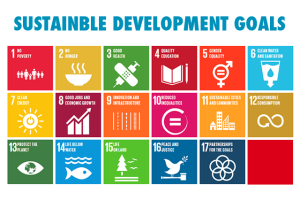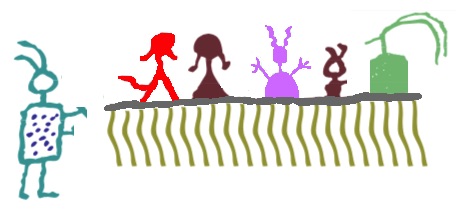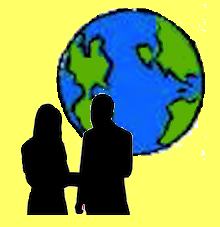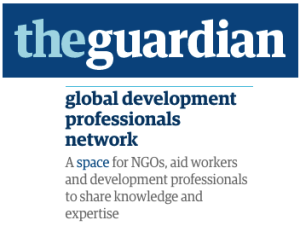Note: since this blog’s publication in November, I’ve been adding how Trump’s presidency actually is affecting humanitarian aid & development:
How will the Trump Presidency affect humanitarian aid and development policy and practice?
And how will it affect humanitarian aid and development workers from the USA?
Effects on the work
 Aid and development efforts in the last 10 years have made amazing strides in terms of addressing issues that make many people, even a majority of people, very uncomfortable, even angry. It’s oh-so-popular to put in a well for drinking water or to build a school for young children or to provide maternal health care, but it’s rarely as popular in those same communities to encourage women to demand their sexual partners to use a condom to prevent HIV/AIDS, or to suggest a plan for providing housing and other help for refugees from other countries. Women’s equal rights to education, life choices, roles in society and employment are now unquestioned in the policies of most international development agencies, including the United Nations, something I wasn’t expecting when I started working internationally. Honestly, I fully expected some kind of “out” in UN policy documents to allow local people to refuse rights for women, if the refusal was based on religious or cultural grounds. But the UN has stood firm, at least officially. Yes, the UN and other aid agencies absolutely look for accommodation within local cultural and religious practices, they absolutely encourage recognition of local values, and that may mean your meeting with a local village is segregated, with all the men in one place, and all the women in another. It requires very delicate maneuvering at times, but the core policy and priority regarding women’s rights, and other rights, does not change.
Aid and development efforts in the last 10 years have made amazing strides in terms of addressing issues that make many people, even a majority of people, very uncomfortable, even angry. It’s oh-so-popular to put in a well for drinking water or to build a school for young children or to provide maternal health care, but it’s rarely as popular in those same communities to encourage women to demand their sexual partners to use a condom to prevent HIV/AIDS, or to suggest a plan for providing housing and other help for refugees from other countries. Women’s equal rights to education, life choices, roles in society and employment are now unquestioned in the policies of most international development agencies, including the United Nations, something I wasn’t expecting when I started working internationally. Honestly, I fully expected some kind of “out” in UN policy documents to allow local people to refuse rights for women, if the refusal was based on religious or cultural grounds. But the UN has stood firm, at least officially. Yes, the UN and other aid agencies absolutely look for accommodation within local cultural and religious practices, they absolutely encourage recognition of local values, and that may mean your meeting with a local village is segregated, with all the men in one place, and all the women in another. It requires very delicate maneuvering at times, but the core policy and priority regarding women’s rights, and other rights, does not change.
Reaching women in socially-conservative areas, like Afghanistan, can be an incredible challenge, as you navigate a culture that does not want women in public and is easily angered if they perceive an attack on their religion. And just because local senior staff are singing the praises of gender mainstreaming doesn’t mean the staff they supervise has bought in. But, as an aid worker, you have to find a way. It is your mandate. You find a workaround. Because you know that full civil rights for all people is the only way a country can prosper and become resilient to corruption, crime, and armed civil unrest, and when civil rights for any residents are curbed, officially or by widespread cultural practice, the entire country suffers, and your aid and humanitarian efforts will ultimately fail.
Something that shocks a lot of people is that the UN has a human rights mandate that includes rights for people that are lesbian, gay, bisexual, transgender and queer (LGBTQ). The United Nations Free & Equal initiative is on Twitter (@free_equal) and on Facebook. It is an initiative of the Office of the High Commissioner for United Nations Human Rights. There is this video from the UN Secretary General in support of the Free & Equal initiative. I was stunned, and thrilled, to find this out a while back. It’s a daring position, given the majority attitudes about LGBTQ people throughout the world, including right here in the USA. In promoting equality and human rights, it’s a great comfort to know that a major international development agency has your back, policy wise.
The United States Agency for International Development (USAID), a government agency, also has the LGBT Global Development Partnership. It was put into the planning and formation stages by Secretary of State Hillary Clinton and then launched in April 2013 under the tenure of Secretary of State John Kerry. The initiative works to strengthen the capacity of local LGBTQ leaders and civil society organizations in developing countries and to enable the economic empowerment of LGBTQ people in those countries through enhanced entrepreneurship and small and medium-sized enterprise development.
The UN and USAID initiatives in support of LGBTQ people are in response to the violence, economic hardship, stigma and political marginalization that are a daily fact of life for millions of LGBTQ people throughout the world. These people experience a lack of employment opportunities, discrimination in access to health care, housing and education and violations of their civil rights regularly because of their sexual preference. 83 countries and territories currently criminalize LGBTQ behavior or identification, and at least eight have laws allowing the imposition of the death penalty for same-sex relations. These USAID and UN initiatives are desperately needed, as are women’s empowerment initiatives. As are initiatives to help refugees. As are initiatives to help religious minorities. As are initiatives to help people with disabilities. And on and on.
But now, the USA elections of 2016 show that the majority of people in the USA support politicians dedicated to eliminating the civil rights gained by LDBTQ people in the USA over the last five years. Donald Trump is on the record as planning to create a militarized deportation force to remove 11 million undocumented immigrants from the USA, to ban the entry of Muslims into the USA and aggressively surveil any Muslim already here, to punish women for accessing abortion once he makes it illegal with the help of his Supreme Court appointees and Congress, and to change our nation’s libel laws and to restrict freedom of expression and freedom of the press. He talks about fully militarizing and otherwise empowering police to enforce “law and order” regarding Black and Latino Americans and other racial minorities in their own communities. He has said climate change is a “hoax” and that he will eliminate all government programs that address such. He promotes myths about vaccine safety. International programs that run contrary to these soon-to-be official policy positions in the USA, that run contrary to the values of many millions of Americans who support this administration, are now in severe danger of being eliminated as well.
Even if all of these initiatives are, miraculously, not cut by the Trump administration, they will be much, much harder to deliver in years to come by aid and development workers. Why? Because any local person can look an American aid worker right in the eye and say, “Why are you promoting something – freedom of the press, rights for immigrants, rights for gay people, reducing car emissions, reducing green house gases, increasing wind and solar energy, vaccines for children – that most people in your own country do not support?” Any person can say, “Your own President mocks powerful public women, and brags of sexually assaulting them. Why is it wrong that men in my country are doing the same as him?” People in developing countries intensely watch what happens in the USA, and they are always on the lookout for hypocrisy, for the USA demanding something of another country that it does not do itself. That a majority of American voters support a political party and government lead by a man who promotes nativism, authoritarianism, misogyny and racism will fuel these movements in other countries, resulting in pushback against humanitarian aid and development workers’ efforts for the rights of women, the rights of ethnic and religious minorities, the rights of LGBTQ people, the rights of immigrants and refugees, and on and on.
US development policy can—and has—lifted millions out of poverty and social exclusion, and played a role in transforming countries for the better and creating peace and prosperity where it would not be otherwise. Travel the world, talk to people, you hear the stories over and over, in Africa, in Eastern Europe, and even in Afghanistan, by people that have experienced this transformation first hand. Yes, there is still vast amounts of work to do, and many gains are fragile, but that lives have improved and business has flourished because of USAID and similar efforts simply cannot be denied. These programs not only benefit local people in their everyday lives; they also create social and economic stability that, in turn, creates a market for USA-made products and reduces the need for American military action. A lot of support for USAID and other development agencies comes from a motivation for growing the USA’s markets overseas rather than any feeling of compassion – and I’m okay with that, because such investment still helps local people, which is MY motivation. Weak or failed states are havens for armed criminal groups, some motivated by religion but most motivated by greed, and these groups not only keep their home country in chaos, they also destabilize neighboring countries. Human freedoms in such countries are at risk – and so are their economies, and all the economies attached to such. And that includes the USA. Natural disasters, including pandemics, also destabilize countries – which, in turn, threatens surrounding countries – and ultimately threatens the USA.
Nancy Birdsall and Ben Leo wrote in White House and the World:
Gender discrimination, corruption, lack of opportunity, and repressive governments in many parts of the developing world are an affront to universal values. America is often the only actor capable of marshaling the resources, political capital, and technical know-how required to address these tough issues.
In addition to security threats, the US economy and the American workforce are more reliant than ever on developing-country markets. US exports to developing countries have grown by more than 400 percent over the last 20 years. Today, they total more than $600 billion annually and are greater than US exports to China, Europe, and Japan combined. Brazil, Colombia, India, Korea, Malaysia, Turkey, and other countries are leading markets for US exports. Three decades ago, these were relatively poor countries that offered limited US export potential. Populous countries like Bangladesh, Ethiopia, and Nigeria have the potential to be the next wave of emerging markets. It makes strategic sense to further advance America’s global prosperity agenda, thereby helping to grow middle-class societies that drive democratic change, promote peace with their neighbors, and reliably purchase US products and services.
Even if what happened far away didn’t affect the USA, I would still want to help – that’s who I am – but the reality is that even neo-liberals have acknowledged this reality, hence why even Republican Presidents in the USA in the last three decades, until now, have supported the idea of a global economy and foreign aid.
(for USA-based readers, particularly Trump supporters – the term neo-liberal doesn’t mean left wing. In the rest of the word, the word liberal means someone who believes unfettered free market capitalism is the best economic and social policy for the world – in the USA, we call those people libertarians or Republicans).
Effects on aid workers
Trump has said he will reauthorize waterboarding and other forms of torture. This, coupled with his stated attitudes about Muslims, immigrants and refugees from Syria, has the potential to put workers in aid and development from the USA, working abroad, in further danger than they already face. It is yet another thing people from the USA working in humanitarian aid and development must consider, must be mindful of as they are offered posts abroad, and must think about as they navigate another country’s landscape.
Distancing yourself from these policies and statements on social media, including Facebook, might adversely affect your employability with USAID and international agencies that receive funding from the US government during the Trump President and Republic control of the federal government, however, such posts could also help you in your work with people from other countries, people angered and further disempowered by Trump’s foreign policy. That doesn’t mean you post anti-Trump memes on Instagram or are ever have to say publicly who you voted for. It could mean posting sometimes on social media of your support of and concern for Muslim Americans, Syrian refugees, people in Yemen, Afghanistan, Iraq, Iran, the Occupied Palestinian territories, human rights for immigrants, etc., and your condemnation of waterboarding, torture and any violations of human rights.
It was already difficult for female aid workers to complain about sexual harassment on the job; when I complained about such 10 years ago, while doing field work, I was told by a UN HR manager, “Well, you just have to ignore it and not let it bother you. If you can’t, you can always quit.” That’s the usual response, I quickly learned when talking to colleagues. But now, women aid workers from the USA are going to be at even greater risk of sexual harassment and assault because of the Trump presidency. The incoming President has, by his statements and behavior, made it acceptable for anyone, including politicians and other government representatives, to rate women by their looks and to insult women reporters, politicians, artists and celebrities with most vile statements about their character, appearance – even their sexuality. His bragging about sexual assault also normalizes such behavior in the minds of many men, in the USA and abroad. Megyn Kelly, a reporter for the politically right-wing Fox News channel, noted to Trump during a Presidential debate she moderated: “You’ve called women you don’t like ‘fat pigs,’ ‘dogs,’ ‘slobs’ and ‘disgusting animals.’ Your Twitter account has several disparaging comments about women’s looks. You once told a contestant on ‘Celebrity Apprentice’ it would be a pretty picture to see her on her knees.” Imagine a female aid worker having such comments directed at her by men she is working with, and when she says these comments are inappropriate, is told, “But it’s what your own President says!” It will be hard to demand such comments stop when the head of the most power country on Earth is saying the same.
For male aid workers in particular, repeated statements on social media and as a part of your aid and development work in support of women’s equal rights and respect for women, as well as condemnations of sexual harassment and assault, can help counter the dangerous narrative being established about acceptable treatment of women. More than ever, your female colleagues need you to speak up when you hear people you are working with joking about sexual assault or women’s behavior.
Final thoughts for now
It’s all quite dire, I know. But it’s based on what Trump and GOP members of the House and Senate have said and promised, and therefore, it must be considered as really happening. Organizations and governments abroad that have counted on support from UN and USAID need to think about what they will do if that support vanishes, both the financial support and the rhetorical support. Aid workers from the USA, more than ever before, need to be conscious of how they are perceived abroad, and remember that the safety climate in a place can change dramatically per a rumor or a sound byte on the news. And aid agencies need to revise all of their safety measures for their staff, particularly women, and to think about how they will reinforce their anti-sexual-harassment policies in the face of this new climate.
Also see:
US aid for women’s sexual health worldwide under threat, from The Guardian
Taking a stand when you are supposed to be neutral/not controversial
Update Dec 1
The UN in the Era of Trump from Centre for Policy Research, United Nations University
The $64,000 Question: Can the UN Survive the Trump Era?, from PassBlue.
Battles to end poverty, inequality will falter in Trump era, experts predict, from Reuters
Also, I’ve gotten two comments from people taking issue with my comment “the USA elections of 2016 show that the majority of people in the USA support politicians dedicated to eliminating the civil rights gained by LDBTQ people in the USA over the last five years.” It is true that Secretary Clinton garnered more votes on election day – and that her lead in the results continues to grow: As of Dec. 1, Clinton has garnered 65,152,112 votes, compared to Trump’s 62,625,928. That’s a margin of 2.53 million votes. The Democratic Party nominee’s margin in the popular vote is also rapidly approaching 2 percentage points. But I’m not sure the vote really does represent what a majority of Americans think. Perhaps I’ve got more access outside the bubble than a lot of folks, but being from a rural part of the USA, I see and hear a jaw-dropping amount of glee over the soon-to-come rollback regarding civil rights gains in the USA. There’s no question in my mind that this is, indeed, what a majority of people in the USA want – and that’s something we need to accept in order to address and change it.
Update:
Donald Trump might be more popular than you think, from Politico, Feb. 2, 2017
Update January 13, 2017
From an article today in The New York Times: “a series of questions from the Trump transition team to the State Department indicate an overall skepticism about the value of foreign aid, and even about American security interests, on the world’s second-largest continent… the tone of the questions suggest an American retreat from development and humanitarian goals, while at the same time trying to push forward business opportunities across the continent.” The article says, “The questions seem to reflect the inaccurate view shared by many Americans about how much the United States spends on foreign aid and global health programs.” In the article, Monde Muyangwa, director of the Africa program at the Woodrow Wilson Institute, noted that “the framing of some of their questions suggests a narrower definition of U.S. interests in Africa, and a more transactional and short-term approach to policy and engagement with African countries.” Ms. Muyangwa said the queries could signal “a dramatic turn in how the United States will engage with the continent.” The article notes that Former President George W. Bush quadrupled foreign assistance levels to African countries during his term, and President Obama largely maintained that, even as his administration was making cuts elsewhere.
Update Jan. 26, 2017
More from undispatch.com: Trump dramatically expanded the scope of the Global Gag Rule to include all global health assistance provided by the US government. Rather than applying the Global Gag Rule exclusively to US assistance for family planning in the developing world, which amounts to about $575 million per year, the Trump memo applies it to “global health assistance furnished by all department or agencies.” In other words, NGOs that distribute bed nets for malaria, provide childhood vaccines, support early childhood nutrition and brain development, run HIV programs, fight ebola or Zika, and much more, must now certify their compliance with the Global Gag Rule or risk losing US funds.
Update February 8, 2017: Charities Say That Trump’s Refugee Ban Will Be “Incredibly Problematic” For Their Work Abroad. Charities operating in countries on the US president’s banned list, or employing staff with dual nationality from these nations, also warned the ban would jeopardise their work. A nonprofit has said plans to have Syrians speak to the US Congress have had to be shelved.
Update February 27, 2017: With aid under attack, we need stories of development progress more than ever – from the Overseas Development Institute (ODI), the UK’s leading independent think tank on international development and humanitarian issues.



 . For the record; the photos we provided were of adult women who had consented to having their photos taken.
. For the record; the photos we provided were of adult women who had consented to having their photos taken. I thought it would be fun to start the New Year off with some humor.
I thought it would be fun to start the New Year off with some humor.



 Today, I got an email from a close friend in Kabul, a young Afghan woman who works in an Afghan federal ministry. She forwarded me an email from another Afghan colleague, telling her she had “won” a USA visa and that she had to pay $150 in order to finalize the process. She wanted to know if it was real.
Today, I got an email from a close friend in Kabul, a young Afghan woman who works in an Afghan federal ministry. She forwarded me an email from another Afghan colleague, telling her she had “won” a USA visa and that she had to pay $150 in order to finalize the process. She wanted to know if it was real.